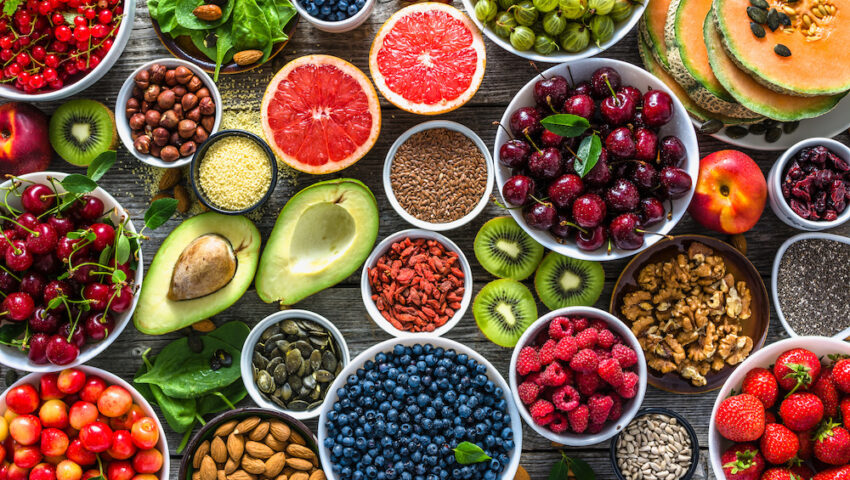Blogs
5 Top Tips for Men’s Health

The fundamentals of having a healthy balanced diet are similar for men and women. However, men’s nutritional needs differ due to biological, physiological, and metabolic functions, such as: having a leaner body mass and production of different hormones.
UK government dietary recommendations for adult men (daily) are:
| Energy | Approx. 2500kcal |
| Fat | No more than 97g |
| Saturated fat | No more than 31g |
| Carbohydrate | At least 333g (50% food energy) |
| Free sugars | No more than 33g (5% food energy) |
| Fibre | 30g |
| Salt | No more than 6g |
5 Top Tips for Men’s Health
Eat more fruit & vegetables.
Currently, in the UK, only 1 in 3 men achieve the 5ADAY recommendation. Studies have found that consuming your 5ADAY can help reduce the risk of serious health conditions such as heart disease.
A good way to ensure you are consuming your 5ADAY recommendation is to spread it out throughout the day by choosing fruit and vegetables as snacks and adding additional fruit and vegetables to bulk out meals.
For example, add carrots and mushrooms to your spaghetti bolognaise or add a variety of fruit as toppers to your breakfast porridge or cereal.
Don’t Forget: Fresh, frozen, tinned, and dried fruit all count towards your 5ADAY!
Reduce your consumption of red and processed meats.
In the UK, statistics show that bowel cancer is the 3rd most common cancer in males. High intakes of red and processed meats, even though they are great sources of protein, iron, and zinc, have been associated with an increased risk of developing bowel cancer.
The UK recommendation is:
- 70g (cooked weight) per day
- or around 500g per week.
What does 70g look like?
- A cooked quarter-pound burger.
- 3 rashers of bacon
If you are looking to reduce the amount of red or processed meat in your diet, try and replace it with fish, poultry, eggs, and plant-based proteins such as beans and lentils in meals where possible.
For example, reduce the amount of beef mince in your spaghetti bolognaise and replace the amount with lentils instead.
Reduce your saturated fat intake.
Having some fats in our diet is essential for our health such as:
- Being a source of energy,
- Helping with the absorption of vitamins,
- The healthy development and function of the brain.
However, too much saturated fat (found in butter, lard, ghee, fatty meats, cheese, cakes, and biscuits) has been also linked with adverse health conditions.
The UK guideline for saturated fat is no more than 10% of our total energy a day, however, currently, on average we are consuming 12%.
Try to reduce your consumption by replacing it with unsaturated fats that can be found in plant-based sources such as nuts, seeds, avocados, vegetable oils (olive or rapeseed oil), or oily fish.
Tip: When purchasing food, check the food labels for how much saturated fat it contains.
Consume more fish.
Incorporating more fish and shellfish into your diet is a great way of adding more vitamins and minerals as well as an excellent high-protein alternative to red meat and poultry.
The UK guidelines are to consume at least 2 portions of sustainable fish a week, including one portion of oily fish (such as salmon, mackerel, trout, or sardines).
Oily fish contains omega 3 fatty acids which are important for our heart and brain health, as well as mood regulation. Studies have found that higher consumption of omega 3 in the diet have found to reduce the risk of heart disease as well as reducing the symptoms of anxiety and depression!
Reduce your salt intake.
The UK recommendation for salt is no more than 6g a day (approximately 1 teaspoon).
Whereas the average adult man consumes up to 9.2g a day!
Unfortunately, in the UK 75% of our salt intake comes from foods we buy-in, rather than what we add during cooking or at the table. For example, bread, cereals, snacks, ready-made meals, and pre-made sauces. Even tinned foods are high in salt such as vegetables in brine!
(Great tip is to ensure you rinse any products purchased with brine, to help reduce the salt content).
Salt is a great flavour enhancer, however too much in our diet can increase the risk of increasing your blood pressure, leading to a higher risk of heart disease, stroke, or kidney failure.
How to reduce your salt intake?
- Check food labels when purchasing food and try to opt for lower-salt versions where possible.
- Always taste your food before adding more salt.
- Try to cook from scratch and use other flavour enhancers such as garlic, herbs, and spices.
Note that all recommendations are to help us achieve a healthy balanced diet. We are all unique and our lifestyles will vary such as how physically active we are, therefore these need to be adapted to meet individual needs.
References and further reading:
https://www.nutrition.org.uk/life-stages/men/nutrition-recommendations-for-men/
https://www.nhs.uk/Livewell/Goodfood/Documents/having-too-much-salt-survival-guide.pdf
https://www.nhs.uk/live-well/eat-well/food-types/fish-and-shellfish-nutrition/
British Dietetic Association (2021), Omega 3 Fact Sheet
Calder, P, 2017, New evidence that omega 3 fatty acids have a role in primary prevention of coronary heart disease, Journal of Public Health and Emergency, available online: http://jphe.amegroups.com/article/view/3849/4641




